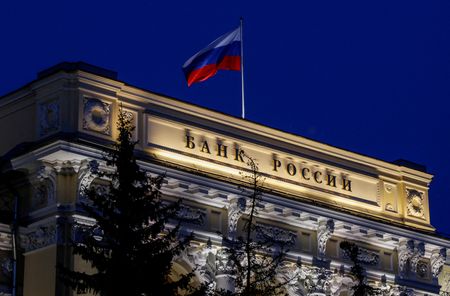By Elena Fabrichnaya and Alexander Marrow
MOSCOW (Reuters) – The Russian central bank is expected to hold its key interest rate at 7.5% on Friday, ending a months’-long rate-cutting cycle, as an inflation slowdown becomes less marked and geopolitical uncertainty saps consumer demand, a Reuters poll found on Monday.
The bank has gradually reversed an emergency rate hike to 20% in late February that followed Russia’s decision to send tens of thousands of troops into Ukraine and the imposition of increasingly wide-ranging Western sanctions in response.
Since then, the central bank has cut rates six times, most recently to 7.5% last month. At that meeting, the bank omitted guidance about studying the need for future reductions, fuelling expectations of an end to monetary easing.
Twenty-two of 26 analysts and economists polled by Reuters on Monday predicted that Russia would keep its benchmark rate unchanged on Friday.
Inflation is far above the central bank’s 4% target, but down from 20-year highs shortly after the conflict in Ukraine began.
“Overall, the equilibrium of pro-inflationary and disinflationary risks remains balanced, so the central bank will likely have a pause amid growing uncertainty due to geopolitical escalation,” Mikhail Vasilyev, chief analyst at Sovcombank, said.
The conflict in Ukraine, entering its ninth month, shows no sign of abating. President Vladimir Putin’s partial mobilisation order and subsequent declaration of martial law in four partly-occupied regions of Ukraine that Russia says it owns have exacerbated geopolitical risks.
Economic activity slowed significantly at the end of September, the central bank said this month. Tens of thousands of people have joined the army or fled the country since the Sept. 21 mobilisation order.
While that may have a disinflationary impact, combined with general uncertainty depressing consumer demand, inflationary expectations among Russian households – an indicator to which the Bank of Russia pays close attention – remain elevated.
Annual inflation slowed to 13.68% in September, but the decline was slight, Georgy Vashchenko, deputy director of Freedom Finance Global’s research department, said.
“At the same time there is a risk of a strong decrease in consumer activity in the fourth quarter,” Vashchenko said. “Stimulating growth of retailer and corporate lending by lowering the rate is currently pointless, in my view.”
The Bank of Russia may change its rhetoric on Friday and give a more hawkish signal to the market, hinting at a possible key rate increase at the following meeting, Andrei Duryagin, investments director at MKB Investments, said.
Three analysts forecast a cut to 7.25%, with one predicting a 50-basis-point reduction.
(Reporting by Alexander Marrow and Elena Fabrichnaya; Editing by Barbara Lewis)

